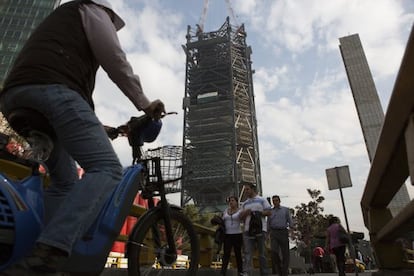Economic growth in Latin America has not reduced informal jobs
Nearly half of working population has no security or social protection

Nearly half of workers in Latin America have informal jobs. Of the estimated 275 million people who are employed in the region, only about 145 million hold jobs where they are paid regular wages and have security.
In a report presented on Tuesday on the regional workforce, the International Labour Organization said that 47.7 percent of workers in Latin America and the Caribbean are part of the informal economy.
During a news conference in Lima, ILO regional director Elizabeth Tinoco called the situation “alarming,” in particular given that the unemployment rate in the region has dropped to a historic 6.3 percent. Last year, the combined jobless rate for Latin America and the Caribbean was listed at 6.4 percent.
“The informal economy rate has not slowed down and does not look as if it will in the near future,” Tinoco said.
According to the World Trade Organization, most of the workers in the informal economy have almost no job security, low incomes and little or no social protection.
In all, 50 percent of the women and 45 percent of men hold informal jobs”
Central America has the highest number of workers who are employed in the informal economy, with Guatemala and Honduras leading the region with 76.8 percent and 72.8 percent of workers, respectively, holding informal jobs. Peru, which last year ranked second, has 68.8 percent of its workforce in the informal economy.
In all, 50 percent of the women and 45 percent of men in Latin America and the Caribbean hold informal jobs.
The ILO report also concluded that some 22 million young people neither work nor study. “Six out of 10 young people hold informal jobs,” said Juan Chacaltana, labor specialist at the regional ILO office.
One of the problems accelerating the informal economy rate in the region is the minimum wage, said Tinoco. In 2012, the minimum salary was raised by 6.9 percent but this year it only climbed 2.6 percent. “In 2012, economic growth declined but consequently so did job growth,” she said.
Tinoco said that regional governments must take “economic measures that cannot be separate from the necessity to generate jobs.” Among these are open dialogue with unions, policies that tackle youth unemployment, the enforcement of child labor laws and a reduction in the numbers of forced layoffs.
The ILT report also points out the low productivity levels in Latin America, which are below the global average. From 2000 to 2010, productivity has improved by just 10 percent.
Tu suscripción se está usando en otro dispositivo
¿Quieres añadir otro usuario a tu suscripción?
Si continúas leyendo en este dispositivo, no se podrá leer en el otro.
FlechaTu suscripción se está usando en otro dispositivo y solo puedes acceder a EL PAÍS desde un dispositivo a la vez.
Si quieres compartir tu cuenta, cambia tu suscripción a la modalidad Premium, así podrás añadir otro usuario. Cada uno accederá con su propia cuenta de email, lo que os permitirá personalizar vuestra experiencia en EL PAÍS.
¿Tienes una suscripción de empresa? Accede aquí para contratar más cuentas.
En el caso de no saber quién está usando tu cuenta, te recomendamos cambiar tu contraseña aquí.
Si decides continuar compartiendo tu cuenta, este mensaje se mostrará en tu dispositivo y en el de la otra persona que está usando tu cuenta de forma indefinida, afectando a tu experiencia de lectura. Puedes consultar aquí los términos y condiciones de la suscripción digital.








































